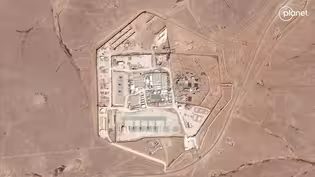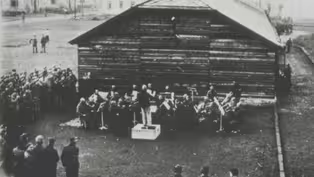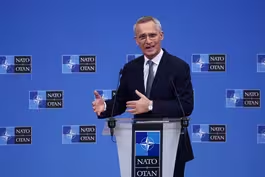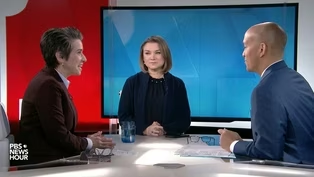
Psychiatrist pushes for reforms on U.S. gun safety approach
Clip: 1/29/2024 | 7m 36sVideo has Closed Captions
Psychiatrist advocates for reforming U.S. approach to gun safety
Already this year, there have been more than 3,000 firearm deaths in the U.S., according to the Gun Violence Archive. Dr. Jonathan Metzl, director of Medicine, Health and Society at Vanderbilt University and author of the new book, “What We’ve Become: Living and Dying in a Country of Arms,” joins William Brangham to discuss how America tackles gun violence.
Problems playing video? | Closed Captioning Feedback
Problems playing video? | Closed Captioning Feedback
Major corporate funding for the PBS News Hour is provided by BDO, BNSF, Consumer Cellular, American Cruise Lines, and Raymond James. Funding for the PBS NewsHour Weekend is provided by...

Psychiatrist pushes for reforms on U.S. gun safety approach
Clip: 1/29/2024 | 7m 36sVideo has Closed Captions
Already this year, there have been more than 3,000 firearm deaths in the U.S., according to the Gun Violence Archive. Dr. Jonathan Metzl, director of Medicine, Health and Society at Vanderbilt University and author of the new book, “What We’ve Become: Living and Dying in a Country of Arms,” joins William Brangham to discuss how America tackles gun violence.
Problems playing video? | Closed Captioning Feedback
How to Watch PBS News Hour
PBS News Hour is available to stream on pbs.org and the free PBS App, available on iPhone, Apple TV, Android TV, Android smartphones, Amazon Fire TV, Amazon Fire Tablet, Roku, Samsung Smart TV, and Vizio.
Providing Support for PBS.org
Learn Moreabout PBS online sponsorshipin the U.S. That's according# to the Gun Violence Archive.
William Brangham is back now with a look at a new## book that critically examines how# America addresse WILLIAM BRANGHAM: In April 2018,# a mentally ill white man took an## AR-15 into a Nashville Waffle House and# shot dead four young people of colo For one researcher at nearby Vanderbilt# University, a man who had studied gun## violence for years, that shooting# prompted a deeper reckoning.
Had## the various gun control approaches he# and others had long championed failed?
That researcher is Dr. Jonathan Metzl.
He's# the director of the Department of Medicine,## Health and Society at Vanderbilt.
And his# new book is called "What We've Become:## Living and Dying in a Country of Arms."
Dr. Metzl, thank you so much for joining us.
The key message here in your book is that# people who have long fought for co ntrol measures, including yourself, things# like red flag laws and background checks,## that they have been arguing for# this public health approach,## and you argue that that approach is# wrong.
Can you explain a littl DR. JONATHAN METZL, Vanderbilt University:# Well, I wouldn't say that it's wrong.
I will say that I have spent a very traumatic and racially charged# mass shooting that happened here in my## hometown of Nashville.
And what# I found was that, on one hand,## I wished -- I'm an advocate for gun laws.# I think we need stronger national gun laws.
But as I uncovered the before and after# of the case and really tracked the story## of how not just a mentally ill white man,# but a naked white man -- he walked into## the Waffle House naked -- how did# a guy like that even get a gun?
How## did he get to the Waffle House in South# Nashville?
And what happened afterwar And as I uncovered that story, I started to# realize that a lot of the positions that I## had been advocating for, background checks,# red flag laws, they're vitally important,## but not only would they have not stopped# this shooting, but they, for me, spoke to## the bigger issues that I address in the book# about race and violence and guns in America.
WILLIAM BRANGHAM: You mention in your# book that the way we have treated## or thought to treat gun violence with# campaigns similar to w cigarettes and secondhand smoke or with# car safety is not effective.
Why is that?
DR. JONATHAN METZL: I tracked the# history of that going back to the '90s.
And I think, at some point, it made sense.# We had in the past.
Here is someone whose product# is killing people, and we came in as public## health advocates and experts and said what we# need to do is impose government regulation,## we need to have commonsense laws, we# need to hold the manufacturers liable.
And that approach worked in cigarettes,## it worked in cars for a couple of reaso were liable for their products.
And the second# was that a lot of people across the country had# relatives who had died of lung cancer or# knew people who had died in car wrecks.
But, unfortunately, as I argue, it was a# wrong turn in the gun debate, because guns## just meant something really different.
Gun# manufacturers were protected from liability,## the kind of liability lawsuits, but also# guns really were not amenable to the kind## of government databases and regulations that# we were advocating because they were tied## to the much longer history of the meanings# of just who got to carry a gun in America,## what that meant that tied into some of our# deepest racial fault lines in this country.
WILLIAM BRANGHAM: I know that, as part of your# research, you talked with a lot of gun owners,## people in the South, conservative, Second# Amendment absolutists, as one might put them.
How do they reckon with this toll# of gun violence from homicides to## suicides to mass shootings?
How# do they see this as a problem?
DR. JONATHAN METZL: For white conservative# gun owners, the issue is this.
There wi a mass shooting in this country.
Again,# they don't want that k But then liberals like me rush in and say what# we need are more government databases or more## red flag laws that empower police to put people in# front of judges.
They hear more regulation, more## government.
And so really what they hear is, for# a lot of the gun owners I spoke to, exactly the## reason they own guns in the first place, which is# that they feel like they mistrust the government.
So I asked a lot of people in the book,# well, how do you think we can resolve## this?
How can we make the -- how can we# feel safe?
And, for them, it wasn't more# regulation.
It was basically improving community# structures and improving community safety.
And so in the book, I end up being kind of# a structuralist and really take seriously,## what would it mean to make communities safer?# What would it mean to invest in communities## and really look at the upstream drivers# not just of gun violence, but the upstream## drivers of why people feel like they need# to carry guns in public in the first place?
WILLIAM BRANGHAM: Help me understand, though,# something that I have often struggled with.
You often do see reports of large polling# institutions will say majori including gun owners, support what we# call -- quote, unquote -- "commonsense## gun reforms," the kinds of things you# have been talking about in the past.
If even gun owners support those things,## why do those things have such a# difficult ti DR. JONATHAN METZL: I think there's a# misnomer in that kind of data.
That data## is true.
Many people do support background# checks, red flag laws, str But that doesn't mean that they vote on those# issues.
I think that's really the misperception.## So if you hear somebody say, I support a red# flag law, it's not like they're going to go out,## if they're a liberal or a Democrat -- they're# going to vote based on many different things.## They might support somebody who supports# climate or the economy or other factors.
And the difference really# is, historically, at least,## Republicans vote on gun issues.
That# has really been the case cert here in Tennessee and across red state# America.
And so part of the story is,## people support those laws, but that's different# from if they're going to go out and vote.
WILLIAM BRANGHAM: We are, as you well know,# entering a yearlong presidential race.
There could not be a more clear# delineation in how we ought to## approach guns between the -- we suspect# the nominee, former President Trump,## and Joe Biden.
How do you imagine that# playing out in this year's election?
DR. JONATHAN METZL: I do think that shifting# popular opinion, plus some of the troubles that## are happening on the very strongly pro-gun# side, create an opening for Democrats.
Toward the end of the book, I discuss an# eight-part plan that I think can improve## the ways that Democrats talk to red# state gun owners that really speaks## their language a lot more about gun safety# entrepreneurialism, fixing larger structures,## addressing the upstream drivers of why# people feel like they need to carry guns.
Because, right now, what we have is Trump, who's# basically telling red state gun owners, I'm going## to let you keep your guns and keep your power,# and Biden, who's saying, I support regulation.
And at least for many gun owners, they're going to# hear that, let me keep my guns and keep my power,## because it's just something that's very deep.
And# I think we need to really disrupt that binary.
WILLIAM BRANGHAM: All right, Jonathan# Metzl of Vanderbilt University.
The book is called "What We've Become:## Living and Dying in a Country of# Arms."
T Thank you so much for being here.
DR. JONATHAN METZL: Thanks so much.
Biden vows to respond to drone attack on U.S. base in Jordan
Video has Closed Captions
Clip: 1/29/2024 | 7m 23s | Biden vows to respond to drone attack on U.S. base in Jordan (7m 23s)
Minneapolis chamber group plays music written at Auschwitz
Video has Closed Captions
Clip: 1/29/2024 | 8m 1s | Minneapolis chamber group performs music written by Polish prisoners at Auschwitz (8m 1s)
NATO chief discusses future of western support for Ukraine
Video has Closed Captions
Clip: 1/29/2024 | 9m 57s | NATO chief discusses future of western support for Ukraine (9m 57s)
Tamara Keith and Amy Walter on a border deal, the 2024 race
Video has Closed Captions
Clip: 1/29/2024 | 8m 23s | Tamara Keith and Amy Walter on a border deal and Nikki Haley's presidential run (8m 23s)
White House halts natural gas, exports over climate concerns
Video has Closed Captions
Clip: 1/29/2024 | 6m 46s | White House halts major liquid natural gas project and new exports over climate concerns (6m 46s)
Providing Support for PBS.org
Learn Moreabout PBS online sponsorship
- News and Public Affairs

FRONTLINE is investigative journalism that questions, explains and changes our world.

- News and Public Affairs

Amanpour and Company features conversations with leaders and decision makers.












Support for PBS provided by:
Major corporate funding for the PBS News Hour is provided by BDO, BNSF, Consumer Cellular, American Cruise Lines, and Raymond James. Funding for the PBS NewsHour Weekend is provided by...





